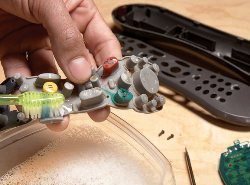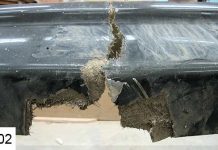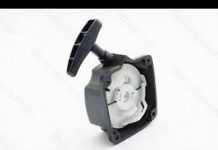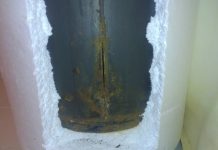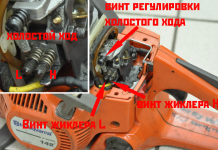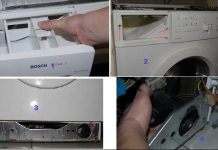In detail: do-it-yourself repair of buttons on the remote control from a real wizard for the site my.housecope.com.
The TV does not turn on with remote control Or don't you switch channels, don't adjust the volume, and the other buttons work fine? Such symptoms malfunctions of the remote control familiar to almost everyone. This malfunction of the remote control is the most common and has been going on since the appearance of the remotes themselves, but the manufacturers have not taken any radical measures to eliminate them. With almost 100% certainty, the cause of such a malfunction is the erasure or contamination of the conductive layer of the contact buttons. There are two resumptions of the remote control in this case:
- First - do not bother and buy a new remote control. It is worth noting that by purchasing a cheap (not original) remote control, you run the risk of encountering the same or another breakdown in the first month. Therefore, if you decide to change the remote control, then, if possible, buy the original remote control and not in the “sharashkin cantor”. This will save you nerves and money.
- Second - repair the remote control yourself. It does not require knowledge of electronics and is available to anyone, regardless of gender and age. Apart from the battery, which you also remove from the remote control, there is no “dangerous” electricity "in the remote control. Even if something does not work out, then the first method always remains in stock, and the money for this will require rather modest ones. But why pay if you can do everything yourself in 15-20 minutes, besides, any new remote control will have the same fate and the experience of the first repair will not be in vain.
It is worth noting that with rare exceptions, repair shops do not carry out such a restoration, or the cost will be comparable to the price of a new remote control. If you decide - then do it yourself, everything is simple, but this article will help you.
| Video (click to play). |
At the beginning, let's dwell on
Diagnostics of malfunction of the TV remote control, tuner, air conditioner or any other equipment
- If the device does not turn on with the remote control and no buttons work, then replace the batteries first. With weak batteries, it is possible to respond to the buttons once or twice in a row, then it does not respond, after some time (20-30 minutes) it reacts again once or twice. This also indicates worn out batteries that need to be replaced. If this does not help, then there is a malfunction in the electronics. Further, depending on your qualifications and desires, you decide on an independent repair. This is not our case and requires knowledge of electronics to repair.
- Checking the remote control with a digital camera.
To do this, just point the remote control at the camera lens or cell phone camera and hold the button. At this point, take a picture of the remote control without the flash. If the remote control or button is working, then the photo will show a bright white spot in the place of the IR LED. If the glow is visible in the photo, then the reason is most likely in the receiver located in the TV or other equipment from which your remote control. Conclusion about the repair, as in the first paragraph.
- If they do not work, or work (respond to pressing) with 2-10 attempts, only a few buttons, the most frequently used, then this is our case. Next, we will consider ways to eliminate this malfunction of the remote control.
All remote controls have a similar device. Main components:
- Frame. Consists of two halves, glued or twisted.
- Printed circuit board. The board contains a small microcircuit, some more radioelements, an infrared LED, contacts of the battery compartment and a contact pad in the form of conductive tracks.
- Rubberized pad with buttons.
At the very beginning, we take out the batteries, then we look in the battery recess for the presence of fastening screws. They can be found under the stickers. Swipe over the sticker with a screwdriver, if it sells somewhere, then there is a screw under it. Examine the entire case for screws. If there is, unscrew everything and divide the case into two halves. In addition to the screws, the case can be latched. If there are no screws, then the whole case is assembled only with latches. It happens that it is additionally glued, but do not panic, everything is sorted out.
We take any knife and gently push the tip into the slot in the middle of the case and try to push the halves apart until a click appears. A click indicates that one of the latches has opened. It is important here to find and disengage the first latch, the rest will go easier. Try to do everything carefully so as not to break the latches, and even if you break one or two, it does not matter, the remote control will not close worse from this, in extreme cases it is easily glued with a drop of any superglue. You can also separate it with two thin screwdrivers, or combine a knife and a screwdriver.
If you are disassembling the remote control for the first time, it is preferable to work with a knife and a screwdriver. First, slip the tip of the screwdriver into the slot, between the halves of the case and, slowly moving the screwdriver along the case, look for the first latch. As soon as you find it, snap it off, but leave the screwdriver stuck near the latch, and then continue to work with the tip of the knife. When you reach the next latch with the knife, you can insert a second screwdriver and continue moving with the tip of the knife, or continue moving with the first screwdriver. In general, do as you like.
Then take out the board and the rubber pad with buttons. The battery compartment has slots into which the spring contacts of the batteries are inserted. Before removing the printed circuit board, remember how they fit in the grooves so that there are no questions during assembly. In most cases, these contact springs are soldered onto the board and do not fit otherwise.
General remarks.
Before reconnecting the conductive layer of the buttons, it is recommended to simply clean it first. Sometimes contamination is visible with the naked eye.
Quite often, the entire space where the rubber base with buttons is located is filled with a transparent sticky and viscous liquid that looks like an epoxy resin, only without a hardener. This liquid is smeared with a neat thin layer, in places with small droplets. This sticky liquid is everywhere. On the top and bottom of the rubber base of the buttons, on the top of the case with sockets for buttons. The top of the PCB with contact pads is also smeared with this glue ...
The origin of this glue is a matter of debate and even controversy in repair circles. Some say that it is grease from the fingers, others that it is fumes from batteries. But why, then, the lower part of the board, where there are no parts, is not covered with these fumes?
The most likely version seems to be that these sticky compounds come from the very rubber base itself. The rubber seems to be sweating, releasing plasticizers from itself, which indicates a violation of the technology for the production of rubber products. The only question that arises is why there are so many such substandard products? This is observed in almost every remote control when such a malfunction occurs.
It should be cleaned with soap or other detergent, but not alcohol, acetone, etc., which can lead to a complete failure of the remote control.
A good result can be obtained by washing the board and gum with buttons with not very hot water, preferably with the use of dishwashing detergent or laundry soap.
Rinse gently with a soft cloth, dabbing with motions, so as not to erase the graphite coating. It is quite good if, before washing off the snotty deposits, the parts of the disassembled remote control lie for some time, about 20 ... 30 minutes, in a detergent solution.After rinsing, do not wipe it off, but wait until the parts are dry and only then assemble the remote control. You can use a hair dryer to speed up drying.
Do not completely assemble the remote control, put the buttons, insert the batteries and check the operation. If everything works, collect and use. If the malfunction remains, proceed to the second stage of recovery. In some cases, you can skip flushing and go straight to recovery. Intuition to help you.
Using glue, carefully glue the pieces of foil onto the pads of the "mat". Foil can be taken from sweets (clean), chocolates, or better from a pack of cigarettes. Aluminum foil with a paper base from cigarette packs is glued quite reliably and simply with any glue of the "Moment" type or superglue from small tubes. Piglets can be made both square and round. You can use a hole punch of a suitable diameter. The result should look something like this.
A 5-7 cm long strip of double-sided tape must be glued to the foil, cut off the edges of the foil where there is no tape. Then we “pass” the foil with adhesive tape through the hole punch as many times as we need to repair the buttons or use scissors. You can also use a broken telescopic antenna. A link of a suitable diameter is taken and circles are carved on the glass. When the circles are ready, glue them on the non-working areas of the remote control buttons. You don't have to bother with circles, but cut out squares.
Additionally, you can carefully use a sharp blade to cut the conductive rubber layer from the buttons in front of the sticker. Typically this is a layer of about 0.5-1.0 mm.
You will need a copper wire with a diameter of 0.2-0.4. Using a hammer, flatten it on any anvil with an interval of about 1 cm. Schematic designation (“——” This is a wire, “O” is a place for flattening) (—- O —- O —- O—-) we cut off the element (—– )
we stick the left end of the element into the button, you can next to the button, bend the flattened part of the element (–– O) over the conductive rubber
If fixed well, then this option is quite durable.
A simpler option is a metal staple bracket. Bend-shorten to the size of the contact pad and press it into the rubber in such a position that when the button is pressed, the bracket closes the contacts on the board.
Another option for repairing the remote control is to smear the buttons with conductive adhesives and varnishes, for example, "Kontaktol" or "Ellast". There are also many different opinions regarding this method, which is not yet clear better. Apparently, everything is simple: whoever succeeds well, he praises and vice versa.
Ready-made repair kits are sold specifically for repairing remote controls. They are cheap - the main thing is to find. The bag contains a tube of glue and round graphite-coated rubber patches. Just spread and glue where you need to. There are even instructions on how to glue.
A more modern version of the repair kit is self-adhesive patch. Everything is quite simple here. In such cases, it will not hurt to wipe the rubber buttons with alcohol or other solvent.
All options are functional and tested in practice. Choose whichever you like best. Good luck.
Despite all the technological breakthroughs, the increase in the speed and the number of commands, the improvement in the design and noise immunity of the remote control are, perhaps, the most vulnerable node of television and video equipment. It is he who gradually or immediately stops working, perplexing the owners. Next, we will consider various typical malfunctions of remote controls and methods for their elimination.
The TV does not respond to any of the buttons on the remote control
Here the question immediately arises - what to do and who is to blame. It is undoubtedly necessary to start checking with what is simpler, namely with the remote control.First of all, you need to check if the remote control works at all. This is very easy to do. It is enough to bring the LED of the remote control to the camera lens, which is in any phone, and press any button. In this case, flashes of the remote control LED will be visible on the viewfinder screen. The color can be from white to bluish, everything seems to depend on the camera.
If these flashes are present, then we can assume that the remote control is almost operational. Pressing all buttons in turn allows you to test each button separately. Before doing this test, it is advisable to check the batteries. The easiest option is to replace the batteries with new ones or check the existing ones with a multimeter.
Checking batteries with a multimeter
The best way to do this is in the DC current measurement mode on the 10A range. At lower limits, it is possible to "blow" the 250mA fuse inside the device. Unlike rechargeable batteries, batteries are not afraid of short circuits, and if we manage to measure the current within 200..500mA, then everything is in order. It is better to check it separately for each battery, it is easier to hold it in your hands together with the test leads of the device.
If you measure the voltage on the batteries, then you need to load them, otherwise even unusable batteries can show the presence of voltage. In the process of checking - replacing the batteries, pay attention to the contact plates in the battery compartment. If oxide deposits or rust are found, the plates should be cleaned with sandpaper or even a small file.
To avoid scandals at home, the number of TVs must be at least two. This is the best option for checking a "suspicious" remote control. It’s probably known that remotes fit (or don’t fit) both home TVs.
If the batteries were changed, the camera was looked at, and there were no light pulses from this, then the remote control would have to be disassembled.
A small note: if the normal operation of the remote control stopped immediately after it was dropped on the floor, then first of all, after disassembly, you should pay attention to the ceramic resonator.
Disassembling the remote control
All consoles are arranged and disassembled in a rather monotonous manner. The first thing to do is remove the batteries from the battery compartment. In the same compartment, carefully look if there are any fastening screws here, as a rule, this is their place. But often there may be no screws at all. In this case, you can start dividing the remote control into two halves.
For this, a suitable tool, such as a screwdriver, is inserted into the joint. Some descriptions of this procedure say that the screwdriver can leave traces in the form of chips and scratches. Therefore, it is safer in this regard to use a regular credit card, which are issued in immeasurable quantities in any "magnet" or "pair". The main thing is to get successfully to the first latch without breaking it, and then gradually and carefully open the rest.
After the remote control is open, the lower part can be put aside for now. The entire remote control will remain in the upper part. The remote control with the bottom cover removed is shown in Figure 1.
Figure 1. Remote control with cover removed
Here we see the reverse side of the PCB. There is an IR LED on the left side, and the yellow square in the lower right corner is nothing more than a ceramic resonator. Here are the contacts of the battery compartment and the only electrolytic capacitor for the entire panel.
If, when checking with the camera, no signs of life were found, then you should immediately check the appearance of the LED and resonator, inspect their soldering. If they are oxidized or have ring cracks, then they must be re-soldered. It is better not just to pierce with a soldering iron, but to remove these parts from the board, clean and irradiate the leads, and only then put them back in place.
If you remove the PCB from the case, you will find a rubber base with buttons under it, as shown in Figure 2.
Figure 2.The buttons, when pressed, close the contact pads on the PCB.
The component side PCB is shown in Figure 3.
Figure 3. Remote controller board
Figure 3 shows the top of the rubber base with button pushers.
Figure 4. Upper part of the rubber base with pushers of the buttons of the remote control
When assembling the control panel, the mentioned pushers are inserted into the slots of the top cover (Figure 5), at the same time being the fixing element of the rubber base.
The pictures show everything quite decently and cleanly, since not long before that the console had undergone minor repairs. As a rule, any remote control opened for repair is a rather miserable and even heartbreaking sight.
What can be seen inside the remote control
The entire space where the rubber base with buttons is located is filled with a transparent sticky and viscous liquid that looks like an epoxy resin, only without hardener. This liquid is smeared with a neat thin layer, in places with small droplets. Even if you try, it won't work out so well and neatly right away.
This sticky liquid is everywhere. On the top and bottom of the rubber base of the buttons, on the top of the case with sockets for buttons. The top of the PCB with contact pads is also smeared with this glue ...
The origin of this glue is a matter of debate and even controversy in repair circles. Some say that it is grease from the fingers, others that it is fumes from batteries. But why, then, the lower part of the board, where there are no parts, is not covered with these fumes?
The most likely version seems to be that these sticky compounds come from the very rubber base itself. The rubber seems to be sweating, releasing plasticizers from itself, which indicates a violation of the technology for the production of rubber products. The only question that arises is why there are so many such substandard products? Indeed, in almost every remote control that gets into repair, just such a defect is noticed.
These evaporated plasticizers are most often the reason for the failure of the remote control. Outwardly, a similar defect manifests itself in the fact that the buttons stop "pressing", you have to increase the applied effort, but after a while this also does not lead to the passage of commands. You can press as hard as you like, for a long time, several times, but the channels do not switch, the volume is not regulated ...
Several repair methods
There are many recipes, advice and opinions on how to deal with this phenomenon. One source advises to immediately wipe all this disgrace with alcohol, gasoline or acetone, another says that in no case. Whom to believe? I will share my own limited experience in the field of remote control repair, there were not many clients, mainly relatives, neighbors and acquaintances, but the simplicity of the device and repair allows us to draw certain conclusions. And if you also listen to what is written on the Internet ...
Once cleaning such a remote control with alcohol led to its complete failure. If before cleaning only a few buttons (probably the most frequently used) worked poorly, then almost all of them stopped working. Therefore, I had to resort to another method of repair, but my memory was deposited that these buttons cannot be washed with alcohol.
A much better result, if the board has such a snotty look, can be obtained by washing the board and gum with buttons with not very hot water using a modern dishwashing detergent. It should be noted that here, too, you can overdo it: if you wash the rubber base with very vigorous movements and press harder, then the result can be exactly the opposite. The graphite coating from the buttons will be washed off, and you can then press them as much as you like, while not at all fearing that pressing the button will cause a channel change or volume control.
If the graphite coating has not been washed off before, then it should be washed with a soft cloth, with gentle, dabbing movements, which will never erase the graphite coating. The inside of the case and the PCB are best cleaned with a glass jar and bottle brush. It is quite good if, before washing off the snotty deposits, the parts of the disassembled remote control lie for some time, about 20 ... 30 minutes, in a detergent solution.
After washing, you should be patient, wait until the parts are dry, and only then assemble the remote control in the reverse order. If such a flushing gave a positive result, the remote control is working, you can only rejoice at the result. Otherwise, you can suggest several more repair methods.
What to do if buttons are worn to the ground
For these situations, solutions already exist: repair kits for repairing the remote control are being sold. The bag contains a tube of glue and round graphite-coated rubber patches. Just spread and glue where you need to. There are even instructions on how to glue. A more modern version of the repair kit is self-adhesive patch. Everything is quite simple here. In such cases, it will not hurt to wipe the rubber buttons with alcohol or other solvent.
But, unfortunately, it is not possible to buy such semi-finished products everywhere and not always, although the price of the issue is simply ridiculous: where are we and where is the radio market. In these cases, you have to use various improvised means. One of the best available materials is paper-backed aluminum foil from cigarette packs. It is glued quite reliably and simply with any glue of the "Moment" type or superglue from small tubes.
Another option for repairing the remote control is to smear the buttons with conductive adhesives and varnishes, for example, "Kontaktol" or "Ellast". There are also many different opinions regarding this method, which is not yet clear better. Apparently, everything is simple: whoever succeeds well, he praises and vice versa.
Of course, modern prices for remote controls are not high, and it's easier than inventing something, go and buy a new one. But it happens that the TV is so old that not a single modern remote control is suitable. Most likely it's time to buy a new TV along with the remote control. Or, nevertheless, to repair the old remote control.
Probably, many of the readers have come across the repair of the remote control (doo) from the TV.
Quite often, the buttons on the remote control completely or partially fail. This malfunction can be caused by various reasons: bad batteries, dirty contacts, or breakdown of other elements.
If any problem occurs, it is better not to rush to throw away the product, but try to repair it yourself. Moreover, it is not always possible to find a high-quality remote control of the original model on sale, for example, a Samsung smart TV.
But if you know the types of breakdowns, then they can be easily eliminated with your own hands.
In most cases, there are several types of remote control breakdowns:
- frequent falls, which could lead to the failure of quartz and important elements; there may be no reaction to certain keys, but when you press others, this is not observed; lack of work for frequently pressed buttons; sometimes, in order for the buttons to work, they have to press hard; the remote control works, but only at close range.
But identifying the reasons is still half the battle; you need to know the repair procedure. Therefore, it is worth considering a detailed troubleshooting procedure. The complexity of the repair directly depends on the type of breakdown.
If everything is in order with the batteries, then the remote control can be checked using a cell phone camera. Since an infrared emitter is installed in it, capable of detecting any interference.
This procedure should be performed according to the following scheme:
- The first step is to turn on the cell phone camera.
- We direct the remote control to the camera. We bring the camera close enough and press any button on the remote control.
- If there is a signal from the remote control, a thick red dot should appear on the phone screen.
But sometimes this signal may not be there. In this case, the device must be disassembled and the board removed. Next, you need to carefully look at this board and make the necessary repairs.
It is necessary to disassemble the device with special care - it is important not to break the body of the product. The first step is to take out the batteries, examine the area where they were bookmarked. If there are screws, then they are unscrewed.
If the device has latches, then it can be disassembled with a thin-pointed screwdriver or a plastic card. To do this, a screwdriver or card must be inserted into the hole located at the top and bottom.
Repair can be done by someone who knows how to work with a soldering iron. Quite often, as a result of frequent drops, the LED may fall off, and the contact pads of the batteries may come off or the quartz-type resonator may be damaged.
You also need to shake the board and listen. If there is a rustle, then this may be the reason for the breakdown of the quartz resonator.
Next, you need to remove this element (it looks like a small soldered box). Then it changes to a new one. It can be purchased at any radio store, as well as in the online radio parts store.
In these situations, a condition of oil condensation occurs inside the device. The elimination of these breakdowns can be done independently.
The repair procedure should be carried out according to the following scheme:
- The remote control is disassembled. The board is wiped with a cotton swab dipped in alcohol. Due to this, the board is cleared of plaque.
- You also need to wipe the contact pads of the buttons on the rubber part. You can clean the case. But it is not advisable to rub hard, otherwise important contacts can be damaged.
- Separately, it is worth cleaning the spring contact. If the contamination of the element is too strong, then to clean it, use sandpaper and wipe with a sponge with a hard base.
- After cleaning and drying, all parts must be put back together.

Yes, indeed, Chinese models can completely break down after this treatment. Therefore, to eliminate these consequences, prepare a solution of soap and water.
Then a sponge is dipped in there, and all contaminated parts are wiped off. After that, all parts with a soapy solution are cleaned with cool water, wiped with a paper towel and left to dry completely. At the end, the console is assembled.
In these situations, you can easily make your own remote control. For repair, you will need the following elements:
- foil, it is imperative that there is a paper base on one side;
- silicone-based glue or Moment glue. There are also adhesive mixtures with a conductive base.
How to fix the problem yourself:
- First of all, we disassemble the device and take out the rubber part.
- Foil paper is glued to the back of the buttons. Foil from cigarettes or chocolates is perfect.
- We glue the foil with the paper part of the silicone mixture or the Moment glue.
- There is also a special conductive glue for gluing, but its cost is quite high.
- On sale there are kits with glue and spray buttons. These kits can easily be used to repair the remote control yourself. In the area where the old buttons with attrition were located, you just need to glue the new ones.
If the remote control finally breaks down and any attempts to repair it with your own hands did not lead to the desired result, then it will have to be replaced with a new one. Moreover, you can find similar products on sale that do not need to be specially tuned for your TV.
Do-it-yourself remote control repair is not such a difficult process. Sometimes you can simply replace the batteries and the remote control will resume in the same mode. However, batteries may not always be the cause of product malfunction.
Perhaps the breakdown was caused by other consequences. In any case, if everything is done according to the instructions, then the malfunction can be easily eliminated by yourself.
From this video You will learn how to repair a TV remote control with your own hands:
Our everyday life can no longer be imagined without telephones, remotes, calculators and other devices equipped with small rubber keyboards. Everything is fine, but over time the buttons stop pressing and you need to do something about it. Of course, the most common problem is pollution. But sometimes the conductive coating itself on the button pads is erased and is simply not able to close the contacts on the board. The article talks about how you can restore such buttons.
First you need disassemble device. Usually there are no problems with this: unscrew a couple of screws, and then separate the halves of the case.
Inside, you will most likely see perennial mud deposits, fat, syrup and other waste products. Sometimes the sight may not be for those with a weak stomach ... In my photo, all the insides are cleaned, as I have already tried unsuccessfully several times to fix the buttons until I came to a solution that I am going to share.
The photo shows my old Panasonic cordless phone, but other cordless phones and remote controls look and work the same.
The elements of the remote control (a block of buttons and a printed circuit board) need thoroughly clean and degrease.
For cleaning board used by cotton swabmoistened alcohol or, as a last resort, vodka (use alcohol-containing liquids like cognacs and colognes extremely undesirable - they leave a film that will only worsen the contact). You just need to wipe the board until it is completely cleaned (if it is heavily soiled, you may have to change the cotton wool 2-3 times).
Rubber button block, as well as contaminated elements of the case (at least, the upper part of the case, which is with holes) first need to wash... To do this, free the case from all loose elements (so as not to catch them later from the sewer) and wash in the sink with a brush (you can take a dental) and detergent (any soap or dishwashing liquid).
Dry the washed elements completely and wipe the button block with alcohol from the side of the contact pads - pads.
In most cases, this cleaning may be enough to make the buttons act like new again. But it happens that the conductive coating is erased (graphite sputtering) on the contacts of the buttons and you will have to tinker with this a little.
Of course, the easiest and safest way is to buy a suitable rubber button plate. It is difficult to find them, but it is possible, but they can only cost at the level of the device itself. Chinese remotes do not last long, and they can play in functionality. Therefore, you have to somehow restore contacts.
Usually all options recovery are reduced to gluing foil onto contacts or applying conductive coatings. home problem is that the button block is usually made from silicone rubberwith high chemical inertness. In other words - nothing to her not sticks and not sticks. Actually, that's why baking and molding dishes are also made from it ...
In addition, a certain force is applied to the buttons, under which they can move and bend slightly. As a result, whatever you glue: foil from chocolates, cigarettes, self-adhesive foil, etc. - all this will eventually start to fall off and arbitrarily short the contacts on the board. With conductive varnishes and adhesives (such as "contactol"), the story is about the same - from a week to a month.
There are special repair kits for remote control buttons - a tube of glue and a handful of conductive rubber heels (like Polish Gumki do pilotow). In addition to the fact that they are not always and not everywhere can be found on sale for reasonable money, they still have the same drawback - they fall off over time. And they are not always of a suitable shape or diameter.
But I found for myself simple, inexpensive and at the same time universal option... And our friend will help us out Super glue cyanoacrylate-based. I have a Turkish Akfix 702, but any decent quality will do. All the trick in pre-glue application on the contact heels, after drying of which it is applied Contactol.
On the every heel need to apply a small drop glue. Just a drop so that the corrugated surface is covered glue. In my experience, when the adhesive is applied too thin, it can then flake off, and the thicker layer holds almost tightly when it dries. But also try do not overdoso that no hump in the middle, it will interfere with the clamp.
Probably, you can stick foil circles on the same glue (you can do it with an office punch), but for me this is not at all an aesthetic solution (and not the most reliable one). Therefore, I applied a layer of conductive varnish on the dried superglue. Contactol... It can be applied to heels of any size and shape. Kontaktol dries according to the instructions for 30 minutes, but if you are in no hurry, give it a little more time.
If formed surplus Kontaktola on their rubber need to carefully deleteso that they do not sprinkle and do not short-circuit contacts. Fortunately, they break off very easily.
When everything is ready, you can collect, check and use.
If the buttons on the TV remote control do not work, first, no matter how trite it sounds, check the batteries by replacing them with new ones. The situation has not changed? Try turning on the camera on your mobile phone, aiming it at the diode in front and see if it blinks when you press the buttons. The fact is that a person cannot see infrared radiation, but the camera captures it, as can be seen in the photo.





Does the diode not blink? So, in order to repair the TV remote control with your own hands, you need to disassemble it and check the condition inside. First, pull out the batteries and check if there are any screws under them that hold the case together, then visually inspect the back cover for screws. After unscrewing all the fastening parts, insert a straight screwdriver at the junction of the two parts of the case and separate them, as shown in the photo below.
Some models of TV remotes are fastened with regular latches, i.e. without screws. To disassemble such a case, it is enough to simply separate the connecting parts with a straight screwdriver. This must be done carefully so as not to damage or scratch the plastic!
So, the case is disassembled, now you need to carefully inspect all the details yourself: the board, the contact pads of the buttons, spring contacts for batteries, an emitting diode, conductive tracks and ceramic quartz.
Let's start with the spring contacts for the batteries. Check if the contact from the microcircuit is unsoldered, if everything is in order, go ahead. No - take a soldering iron and solder it carefully. By the way, you can make a soldering iron yourself if you don't have a normal tool at hand.
Also, look at the state of the spring itself, which is in contact with the battery, it may be heavily soiled and rusted. If so, to repair the TV remote control with your own hands, you need to clean it with sandpaper.
The next possible reason is the contamination of the contacts of the buttons with oily dirt. The appearance of this dirt - long use of the device, as a result of which the condensation of fat from the skin of the hands settles on the contact pads. If these pads are rubber, you must wipe them well with a swab dipped in alcohol or wet wipes. Also wipe the board as maybe dirt is shorting out the contacts, causing the buttons on the TV remote control to not work.
If the contacts are graphite-coated, the malfunction may be that this coating has worn off over time. Repairing the TV remote control in this case is quite simple - you need to take the foil from the chocolate bar, cut into small squares and glue the paper side to the contacts.
By the way, if the buttons on the TV remote control are not pressed well, you need to press hard on them, the cause of the malfunction is the same and you can repair the device by cleaning the contacts or restoring them.
If only some of the buttons do not work, and even then, the most necessary - turning on the TV, switching the volume or channels, then, most likely, the graphite spraying has worn out on them!
Also faulty ceramic quartz can be a possible cause of breakage. If the remote control does not work after a fall, then by 95% you can be sure that this element of the circuit has broken. It is quite simple to determine this on your own - shake the board, and if a rustle is heard from the quartz, it means that it is not functioning. Repair in this case comes down to replacing the quartz.
If you can turn off / on the TV, change programs or sound only at close range, either the dead batteries or the diode are to blame. In the latter case, you can check the health of the emitting diode at home by visual inspection of the soldering, as well as by checking through the phone camera. If the diode is really hooked, it will also have to be replaced.
Well, the last malfunction is damage to the contact tracks. If you see cracks on the microcircuit, then repairs will be inappropriate here, and it is best to just buy a new remote control device.
You can clearly see how to repair some of the faults yourself in the video examples below:
If the buttons on the TV remote control do not work, you can also repair them yourself by purchasing a repair kit in ready-made patches and glue. Of course, it costs a lot, but one such kit is enough to repair 3-4 devices.
You can also, instead of sticking the patches, just drip a special glue called "kontaktol" onto the degreased rubber contacts of the buttons. The only problem is that it is quite expensive, but nevertheless, for a novice electrician, such glue will come in handy at home in order to repair other electrical appliances.
Finally, I would like to note - if your TV remote control sticks or does not work due to contamination of the buttons, after thorough cleaning, we recommend wrapping the device in a bag (even special ones are sold) or a thin film. In this case, fat will not get on the microcircuit and contact pads.
That's all I wanted to tell you about why the TV remote control does not work and how to repair it yourself at home! We hope that the instruction with photo and video examples was useful for you!
It will be interesting to read:
| Video (click to play). |

